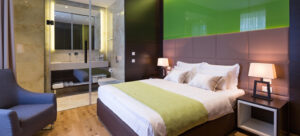The hospitality industry has always been a dynamic and ever-evolving field. With travelers seeking unique and comfortable accommodations, hoteliers constantly strive to meet and exceed these expectations. In this pursuit of excellence, one innovation stands out as a game-changer: prefabricated commercial buildings. These modular structures are reshaping the way hotels are built, offering a myriad of advantages that traditional construction simply cannot match.
In this article, we will explore the world of prefabricated commercial buildings and delve into why hotels should seriously consider adopting this revolutionary approach. From cost-effectiveness to sustainability and speed of construction, the benefits are vast and undeniable. Let’s take a closer look.
Speedy Construction
One of the most significant advantages of prefabricated commercial buildings for hotels is the speed of construction. Traditional construction methods can be slow and highly dependent on various factors such as weather conditions and labor availability. Prefabricated buildings, on the other hand, are manufactured in a controlled factory environment and then assembled on-site. This greatly reduces construction time, allowing hotels to open their doors to guests much faster.
Time is money in the hospitality industry, and every day that a hotel remains under construction is a day of lost revenue. With prefabricated commercial buildings, hotels can significantly shorten their construction timelines, getting ahead of competitors and boosting their bottom line.
Cost-Effectiveness
Cost considerations are paramount in the hotel business. Traditional construction often involves unexpected cost overruns due to weather-related delays, material waste, and labor inefficiencies. Prefabricated commercial buildings offer a more predictable cost structure. The controlled manufacturing process results in minimal waste, and labor costs are often more manageable due to the streamlined assembly process.
Moreover, prefabricated structures are designed for energy efficiency, which can lead to lower long-term operational costs. Improved insulation, energy-efficient HVAC systems, and modern building materials contribute to reduced energy consumption, putting money back in the hotel’s pocket year after year.
Sustainability and Eco-Friendliness
Sustainability is no longer just a buzzword; it’s a crucial consideration for businesses in every industry, including hospitality. Prefabricated commercial buildings are inherently eco-friendly for several reasons.
Firstly, the controlled manufacturing process generates less waste. Materials are carefully measured and cut in the factory, reducing the need for excess materials that often end up in landfills. Additionally, the efficient construction process minimizes site disruption, protecting local ecosystems and reducing the carbon footprint associated with construction activities.
Furthermore, many prefabricated building manufacturers offer sustainable building options, such as the use of recycled materials and energy-efficient systems. This not only aligns with the hotel’s sustainability goals but also appeals to eco-conscious travelers who increasingly seek environmentally responsible accommodations.
Design Flexibility and Customization
Contrary to the misconception that prefabricated buildings are uniform and lack character, hotels can achieve high levels of design flexibility and customization with modular construction. Manufacturers offer a wide range of design options, allowing hotels to create unique and visually appealing structures that cater to their specific brand and location.
Whether it’s a boutique hotel in a historic district or a modern resort on a tropical island, prefabricated commercial buildings can be tailored to suit the hotel’s aesthetic and functional requirements. This flexibility enables hoteliers to stand out in a crowded market and deliver a memorable guest experience.
Consistency and Quality Control
Quality control is essential in the hospitality industry. Guests expect a high level of comfort and safety, and any construction defects or deficiencies can result in negative reviews and reputational damage. Prefabricated commercial buildings offer consistency and quality control that can be challenging to achieve with traditional construction methods.
These structures are manufactured in a controlled environment where every component is subject to rigorous quality checks. This minimizes the risk of construction errors and ensures that the final product meets or exceeds industry standards. Hotels that prioritize quality and guest satisfaction can benefit significantly from this aspect of prefabricated construction.
Adaptability and Expansion
Hotels often need to adapt to changing market demands and seasonal fluctuations. Prefabricated commercial buildings are inherently adaptable, allowing hotels to expand or reconfigure their facilities as needed. Whether it’s adding new guest rooms, conference facilities, or wellness centers, modular construction offers a cost-effective and efficient way to meet evolving requirements without disrupting ongoing operations.
This adaptability can be a strategic advantage, enabling hotels to respond quickly to market trends and customer preferences. It also provides a degree of future-proofing, as hotels can make changes without significant downtime or excessive costs.
Durability and Longevity
Investing in a hotel property is a long-term commitment, and durability is a key consideration. Prefabricated commercial buildings are designed to meet high durability standards, with robust materials and construction methods that ensure the structure’s longevity.
These buildings are built to withstand the test of time, from harsh weather conditions to heavy foot traffic. Hotel owners can have confidence in the long-term reliability of their investment, reducing the need for costly renovations or structural repairs down the line.
Conclusion
In an industry that thrives on innovation and guest satisfaction, prefabricated commercial buildings are a transformative option for hotels. The advantages they offer, from speedy construction and cost-effectiveness to sustainability and design flexibility, make them a compelling choice for both new hotel developments and renovation projects.
As hotels strive to remain competitive and meet the changing needs of travelers, embracing modular construction can set them apart in a crowded market. Not only do these structures offer a faster return on investment, but they also align with sustainability goals and provide a high level of quality control.
In the end, it’s clear that prefabricated commercial buildings have the potential to revolutionize the hospitality industry. By considering this innovative approach, hotels can not only meet the demands of today’s travelers but also secure their place in the future of hospitality. It’s time for the industry to embrace the future and build a better, more sustainable, and more profitable tomorrow.
